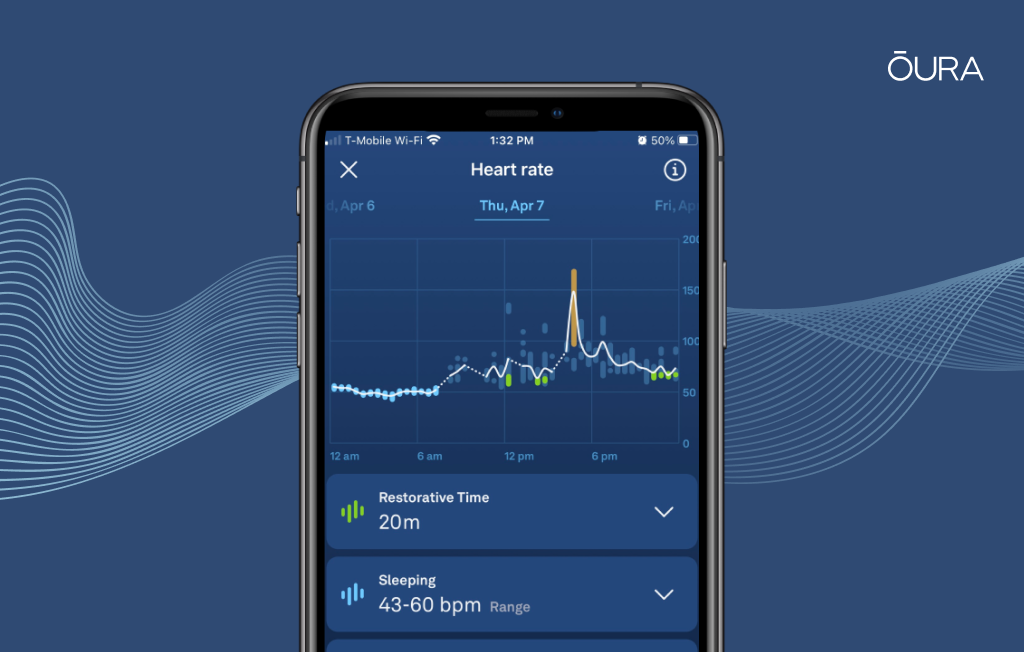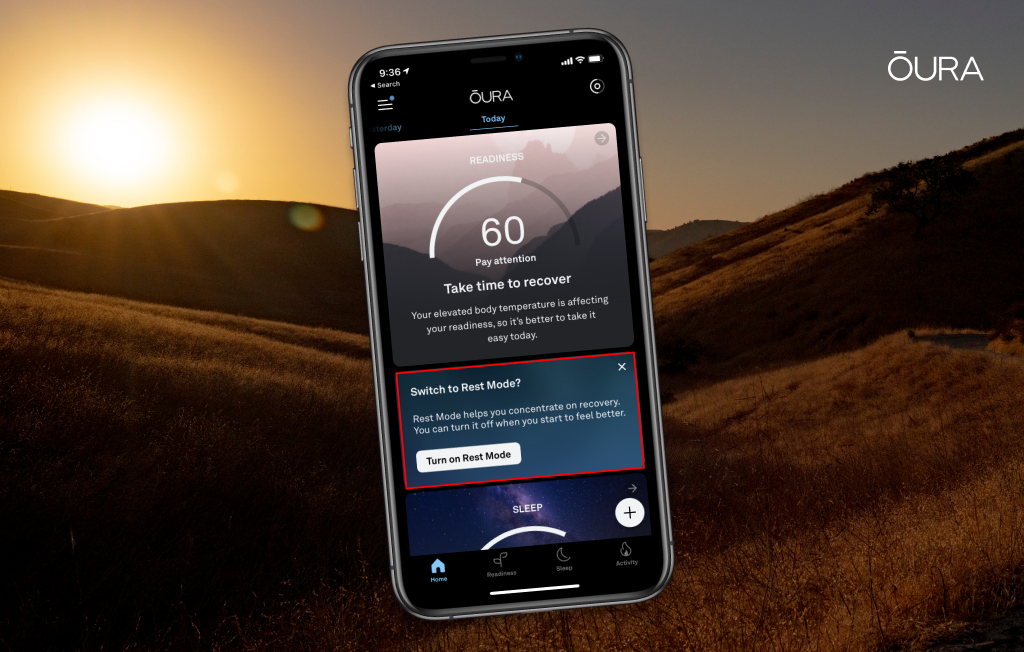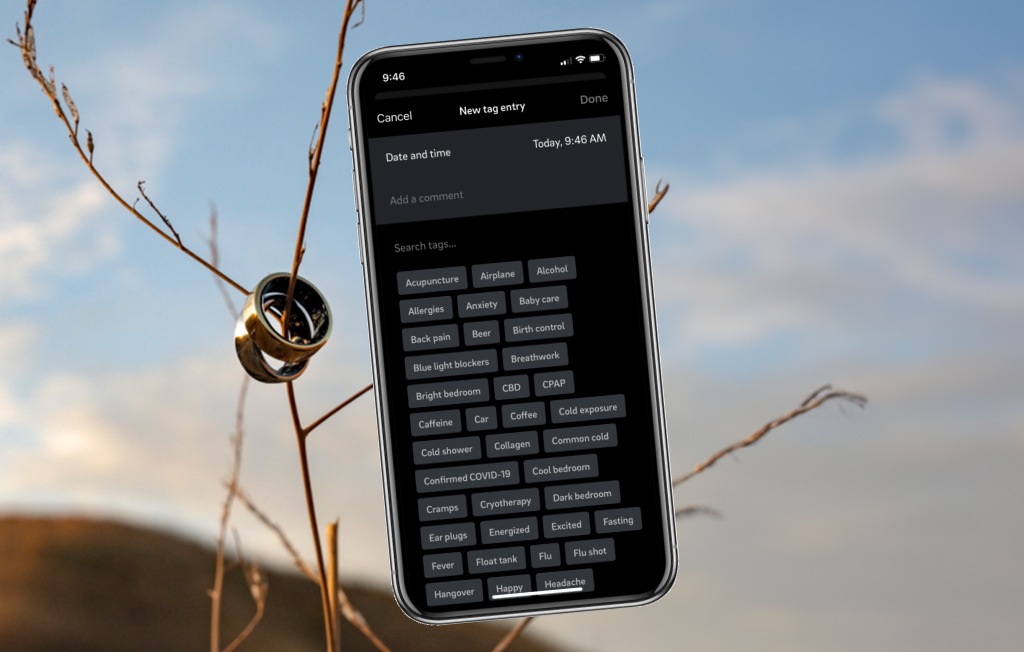- In your Oura App, you may see an elevated heart rate for a number of reasons — including illness, alcohol, stress, exercise, or stress. Mostly, it’s temporary and no cause for concern.
- When you get sick, your heart rate is often higher as your body works to fight off the infection. According to Oura data, members see an average increase of 8.5 bpm when they tag “fever” or “flu.”
- To support recovery and help lower your heart rate while sick, turn on Rest Mode in your Oura App.
Your heart rate signifies the number of times your heart beats per minute. It’s an essential indicator of your cardiovascular health that is constantly changing in response to factors such as physical activity, stress, and illness.
A related, but slightly different metric, is your resting heart rate, which represents the number of times your heart beats per minute when you’re sitting, lying down, or asleep. Most adults have a resting heart rate (RHR) of around 60 to 100 beats per minute (bpm). If you’re very active or an athlete, your RHR could be as low as 40 beats per minute.
RELATED: What Is the Average Resting Heart Rate of Oura Members?
It’s important to note, however, that your resting heart rate is unique to you. And rather than compare your RHR to others, you should only compare it to your own baseline.
| Member Tip: Once you’ve been using Oura for a few weeks, it will have established your baseline resting heart rate and can alert you to any deviations that could indicate strain. |
Keep reading for more reasons why your resting heart rate might be higher when sick, and some potential ways to slow yours down.
How Oura Measures Your Heart Rate

The 24-hour Heart Rate Graph in the Oura App provides the ability to monitor your heart rate 24 hours a day. Oura members can find it in the Home tab of the Oura App, where it shows color-coded visualizations of your sleeping, daytime, and workout heart rates, as well as periods of Restorative Time, all in the same chart.
Additionally, your overnight resting heart rate is one of the contributors to your daily Readiness Score — an indicator of how ready you are for the day ahead. When Oura detects a higher-than-usual resting heart rate during the night, it may cause your Readiness Score to be lower, and Oura will make personalized suggestions for recovery.
How Accurate is Oura Ring for Heart Rate Tracking?
You may be wondering how accurate a wearable can be for tracking heart rate. Don’t worry, it’s good news. According to external validation studies, researchers found “very high agreement” between the Oura Ring and the gold-standard, ECG measurement. The Oura Ring performed near-perfect for resting heart rate (r² = 0.996) and extremely high for heart rate variability (r² = 0.980) when compared to a medical-grade ECG device.
READ MORE: How Accurate Are Oura’s Heart Rate & HRV Measurements?
What Causes a High Heart Rate?
The main cause of a higher-than-normal heart rate? Illness. When you’re sick, it places your body under stress, and your heart rate may increase in response to an elevated body temperature or inflammation.
Oura data confirms: On days when Oura members tag “flu” or “fever” in their Oura App, their average heart rate increases by an average of 8.5 bpm from their baseline.
Typically, an elevated heart rate during illness is usually no cause for concern — it shows your body’s working hard to recover as quickly as possible. However, it should return to normal once you’re feeling better or the stressor has passed.
Other common causes of an elevated heart rate include:
- Alcohol: A 2022 analysis of Oura member data revealed that alcohol increases resting heart rate by an average of 4.8% and affected 74% of members.
- Activity: During periods of activity, such as a workout, walk, or even playing with your kids, your heart rate increases to pump more oxygen-filled blood to your muscles. After the activity ends, your heart rate should return to normal.
- Late-night eating: That midnight snack may keep your resting heart rate elevated as you sleep. To prevent this, try to eat your last meal at least two hours before bed.
- Stress: When you feel stressed, your sympathetic nervous system is activated, switching on your “fight-or-flight” response. Adrenaline is released, raising your heart rate, breathing rate, and blood pressure. Once the stressor has passed, your heart rate should return to normal.
| Member Tip: Gain further insights into your overall heart health by using Oura’s new heart health features: Cardio Capacity and Cardiovascular Age. |
Why Your Heart Rate Is Higher When Sick
When you fall ill, every system in your body works to fight off the infection. Usually, there are several things going on at once, all of which contribute to a higher heart rate. Here are six of the most common factors.
1. Your sympathetic nervous system is triggered, which can increase your heart rate.
The autonomic nervous system (ANS) plays a crucial role in regulating your heart rate. It consists of two parts: the sympathetic nervous system (SNS, or fight-or-flight response), which increases heart rate, and the parasympathetic nervous system (PNS, or rest-and-digest response), which slows your heart rate down.
The SNS activates in response to both internal and external stressors — and since sickness is a kind of stress, it can kick into action when your body is fighting off infections, leading to a higher heart rate.
| Member Tip: Track your level of physiological stress on the Oura App under “Daytime Stress,” which uses changes in your heart rate, body temperature, and motion, to indicate times that you’re stressed. |
2. Inflammation can cause your heart to beat faster.
When you get sick, your immune system reacts by releasing white blood cells to fight off the infection, leading to inflammation. Viral and bacterial infections, such as pneumonia or coronavirus, cause your immune system to release histamines, which trigger inflammation. This is why when you have the flu, for example, your body feels stiff and achy.
Studies have shown that inflammatory markers cause an increase in heart rate. This is because inflammation causes blood vessels to expand, allowing white blood cells and proteins to enter damaged tissues and combat the infection. This expansion of blood vessels signals your brain to increase heart rate and blood flow to the inflamed areas. As a result, your heart rate remains elevated when you’re awake or asleep until your symptoms improve.
3. A fever can cause your body temperature to rise.
When you have an illness or infection, your body temperature rises to try to kill the virus or bacteria, which normally thrive at your baseline body temperature. This, in turn, affects your heart rate — research shows that it increases by roughly ten bpm per degree centigrade.
RELATED: Understanding the Normal Fluctuations in Body Temperature
4. You may be dehydrated.
When you’re sick, a loss of fluids — for instance, through sweat or diarrhea — can lead to dehydration, which also affects your heart rate. When dehydration occurs, your blood volume decreases, meaning your heart rate increases because it has to work harder to circulate it around your body.
5. Pain may also be linked to a higher heart rate.
While pain has long been believed to be linked to higher heart rates and even tachycardia, new research suggests the causal link between them is not as strong as once thought, so the jury’s still out on this one.
6. Certain medications can impact your heart rate.
Some medications you take when you’re sick — such as decongestants, antipyretics, and antibiotics — can affect your heart rate.
How to Lower Your Heart Rate When You’re Sick
A wearable like Oura can help you monitor your heart rate and take the steps you need to recover. Use these six tips to calm your heart rate when sick.
1. Rest and relax.
Illness is often your body’s signal that you’ve been pushing yourself too hard. To help you prioritize your recovery, turn on Rest Mode in your Oura App. This will deactivate your Activity Progress Goal and Activity Score, and your Sleep and Readiness recommendations will also change to help you get some much-needed rest. If your body temperature is elevated, the Oura App may suggest you activate Rest Mode.

2. Stay hydrated.
Drink plenty of fluids, such as water or herbal tea, as this will help prevent dehydration, which can contribute to an increased heart rate.
3. Try deep breathing techniques.
Research shows that a 10-minute session of deep, mindful breathing can decrease your heart rate and blood pressure.
| Member Tip: Head to Explore content in your Oura App to access guided breathing techniques. Plus, after each session, you’ll receive a biofeedback report about changes in your heart rate and skin temperature. |
4. Apply cold compresses.
Placing a cold compress or ice pack on your forehead or neck can help cool your body and potentially reduce your heart rate.
5. Consider taking an over-the-counter anti-inflammatory.
Non-prescription medications like ibuprofen can help reduce fever and inflammation, which may help lower your heart rate.
6. Avoid stimulants.
When you’re sick, it’s best to minimize your intake of stimulants such as caffeine or nicotine, as they can increase your heart rate. In addition, caffeine is a diuretic — meaning it makes you urinate more — which can contribute to dehydration and an elevated heart rate.
RELATED: 10 Most Effective Coffee Alternatives for Pregnancy
7. Track your body’s responses.
Use the Tags feature in your Oura App to track any lifestyle changes and how they affect your resting heart rate, as well as your Readiness and Sleep Scores. When you regularly use Tags, you may see a Discovery. This helps you understand how your daily habits and health conditions impact your health by analyzing the effects of different tags on your biometrics.
LEARN MORE: Introducing Discoveries: Discover How Your Habits Shape Your Health

When to Be Concerned About a Higher Heart Rate When Sick
While an elevated heart rate can be a normal response to illness, it should return to your baseline once you recover. If your symptoms persist, consult your healthcare provider, as it could be a sign of an underlying medical condition, such as heart disease, myocarditis, or arrhythmia.
Additionally, seek medical attention if your heart rate consistently exceeds 100 beats per minute. A heart rate that’s constantly elevated could be a symptom of an underlying condition, such as one of the following:
- Atrial fibrillation: Also known as A-fib, this condition is one in which the heart beats irregularly and faster than it should. An unusually high resting heart rate could be a signal for this — be sure to check in with your doctor if you’re concerned.
Member Story: Oura member Ted N. discovered he was having an A-fib episode from noticing changes in his heart rate data on Oura. - Pneumonia: This condition can push the heart into abnormal fast rhythms, such as tachycardia or palpitations.
- Sepsis: This is a potentially life-threatening condition in which the body’s immune system overreacts to an infection, causing widespread inflammation and a rapid heart rate.
In addition to an elevated heart rate, look out for symptoms such as chest pain, shortness of breath, and lightheadedness that may indicate a more serious underlying heart health problem and seek medical advice as soon as possible.
READ MORE: How Accurate Are Oura’s Heart Rate and HRV Measurements?





